Our Courses Overview
VM Coder offers Node.js full-stack certification training to students seeking to strengthen their IT skills and establish a robust career in full-stack development. The training program provided by VM Coder focuses on equipping students with the knowledge and practical experience required to develop end-to-end web applications using Node.js.
Here's an overview of how VM Coder provides IT-based training in Node.js full-stack development:
1. Comprehensive Curriculum: VM Coder's Node.js full-stack certification training features a comprehensive curriculum that covers essential concepts and tools used in full-stack development. The training covers topics such as Node.js fundamentals, Express.js framework, front-end technologies like HTML, CSS, and JavaScript, databases, RESTful APIs, and deployment strategies.
2. Experienced Instructors: The training is conducted by experienced instructors who have expertise in Node.js and full-stack development. These instructors possess industry experience and are skilled at delivering the course content effectively, ensuring that students receive high-quality instruction.
3. Hands-on Projects: VM Coder emphasizes hands-on learning by providing students with the opportunity to work on real-world projects. Through practical assignments and projects, students can apply the concepts learned during the training and gain valuable experience in building full-stack web applications using Node.js.
4. Industry-Relevant Tools and Technologies: VM Coder ensures that students are exposed to the latest tools and technologies used in the full-stack development ecosystem. The training program covers popular frameworks, libraries, and tools relevant to Node.js and full-stack development, enabling students to develop proficiency in using industry-standard technologies.
5. Support and Guidance: VM Coder offers continuous support and guidance to students throughout the training program. Instructors are available to answer questions, provide clarifications, and offer guidance on projects. This support system helps students stay on track and maximize their learning experience.
6. Certification: Upon successful completion of the Node.js full-stack certification training, VM Coder awards students with a certification that validates their skills and knowledge in full-stack development using Node.js. This certification can bolster their career prospects and serve as a valuable credential in the job market.
7. Career Assistance: VM Coder provides career assistance services to help students prepare for job interviews, refine their resumes, and connect with potential employers. This support aims to empower students and facilitate their entry into the full-stack development industry.
By enrolling in VM Coder's Node.js full-stack certification training, students can enhance their IT skills, gain practical experience in building full-stack web applications using Node.js, and establish a strong foundation for a successful career in full-stack development.
Apply For Training
CURRICULUM & PROJECTS
1. Introduction to Full Stack Development
- - Overview of full-stack development
- - Client-side vs. server-side programming
2. Front-End Development
- - HTML5, CSS3, and JavaScript fundamentals
- - Introduction to front-end frameworks (e.g., React, Angular, Vue.js)
- - UI/UX design principles
3. Back-End Development
- - Introduction to Node.js and JavaScript runtime
- - Understanding the event-driven, non-blocking I/O model
- - Building RESTful APIs with Node.js and Express.js
- - Handling data with databases (e.g., MongoDB, MySQL)
4. Working with Databases
- - Introduction to SQL and NoSQL databases
- - Querying and manipulating data with SQL
- - MongoDB and Mongoose ORM
- - Database design and optimization
5. Authentication and Authorization
- - User authentication concepts
- - Implementing user registration and login functionality
- - Password hashing and security best practices
- - Role-based access control
6. Front-End Frameworks
- - Building dynamic user interfaces with React.js or other front-end frameworks
- - State management (e.g., Redux, MobX)
- - Component-based architecture
7. Deployment and DevOps
- - Introduction to cloud platforms (e.g., AWS, Azure, Heroku)
- - Deployment strategies for Node.js applications
- - Continuous integration and deployment (CI/CD) pipelines
- - Monitoring and error tracking
8. Testing and Quality Assurance
- - Unit testing with frameworks like Jest or Mocha
- - Integration testing and end-to-end testing
- - Code quality and linting tools
9. Project Development
- - Working on a full stack project from start to finish
- - Agile development methodologies
- - Version control with Git
- Skill Development: Training programs provided by companies are designed to enhance specific skills required for the job. These programs can help individuals acquire new knowledge, improve existing skills, and stay updated with the latest industry trends.
- Career Advancement: Company-sponsored training often focuses on developing employees' competencies and preparing them for career growth opportunities. By participating in training programs, individuals can enhance their qualifications, increase their value to the company, and potentially open up new avenues for promotion or better job prospects.
- Increased Productivity: Well-structured training programs can improve employees' efficiency and effectiveness in their roles. By equipping individuals with the necessary knowledge and skills, companies can enhance overall productivity, leading to better performance and outcomes for both employees and the organization.
- Standardization and Quality Assurance: Training programs help establish standard procedures and best practices within an organization. By ensuring that employees are trained consistently, companies can maintain quality standards across different teams and departments, leading to better outcomes, customer satisfaction, and overall operational excellence.
- Personal Growth and Confidence: Training programs not only focus on professional skills but also contribute to personal growth. Employees gain confidence, expand their knowledge base, and develop a broader perspective through exposure to new ideas and experiences. This personal growth can have positive effects on both professional and personal aspects of their lives.
Training helps in to grow your career.
Google Reviews Of
VM Coder Technology

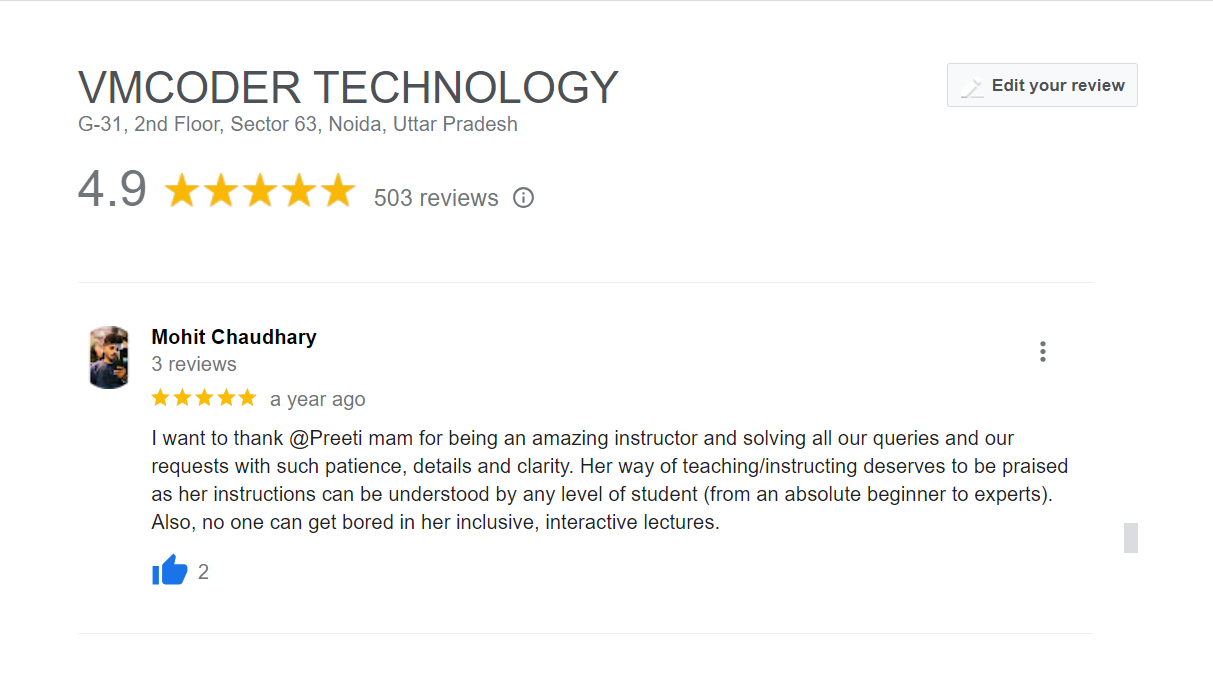
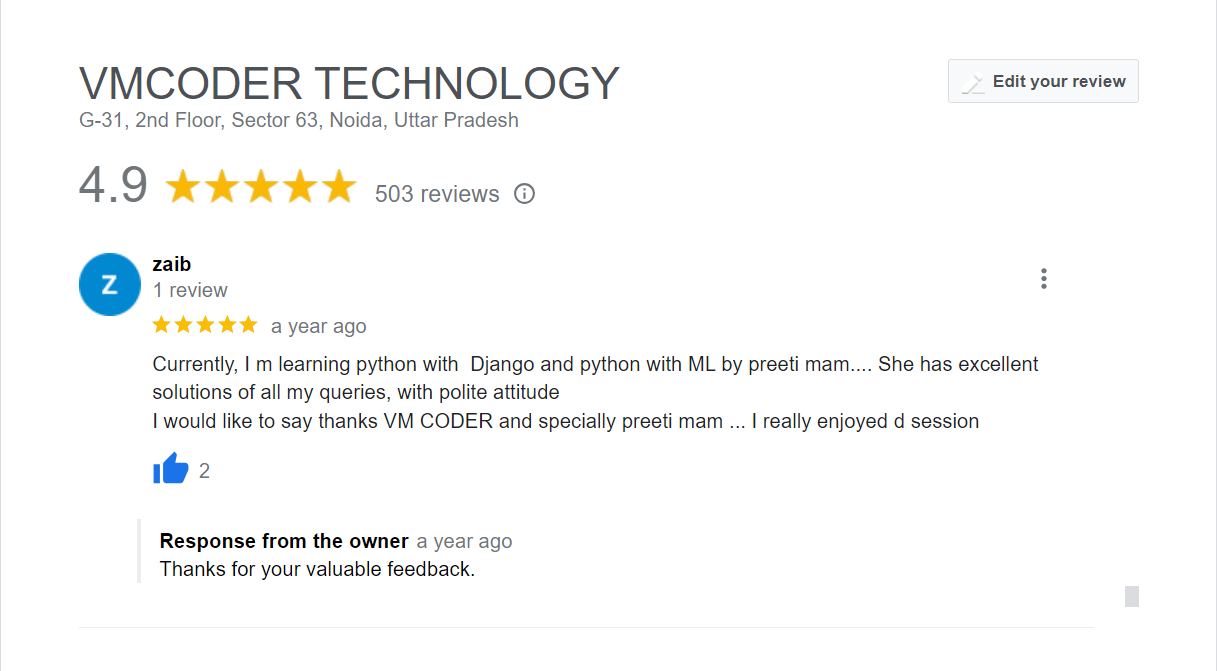
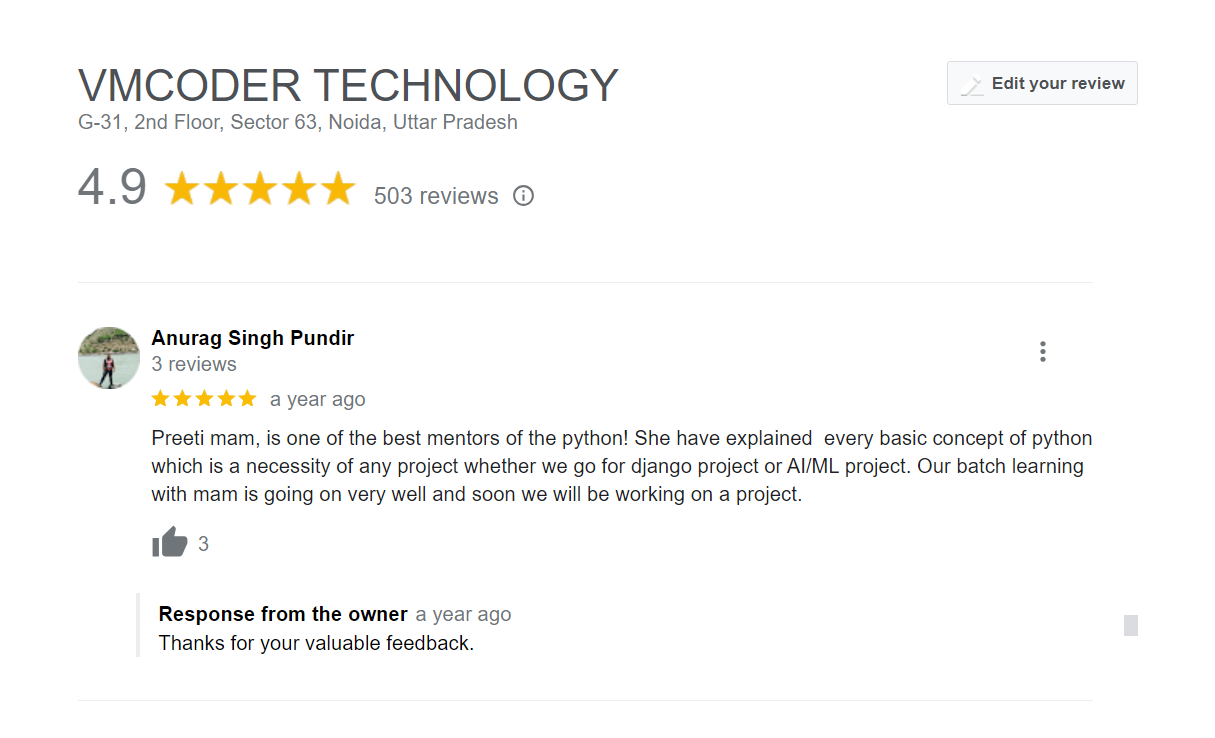
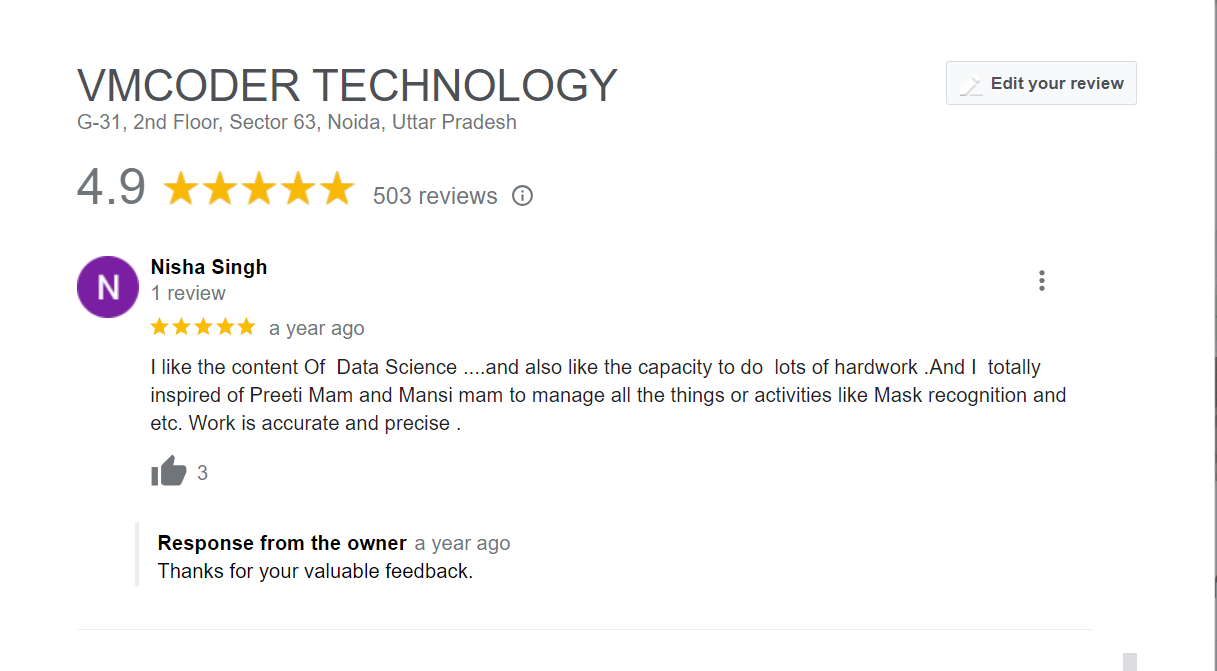
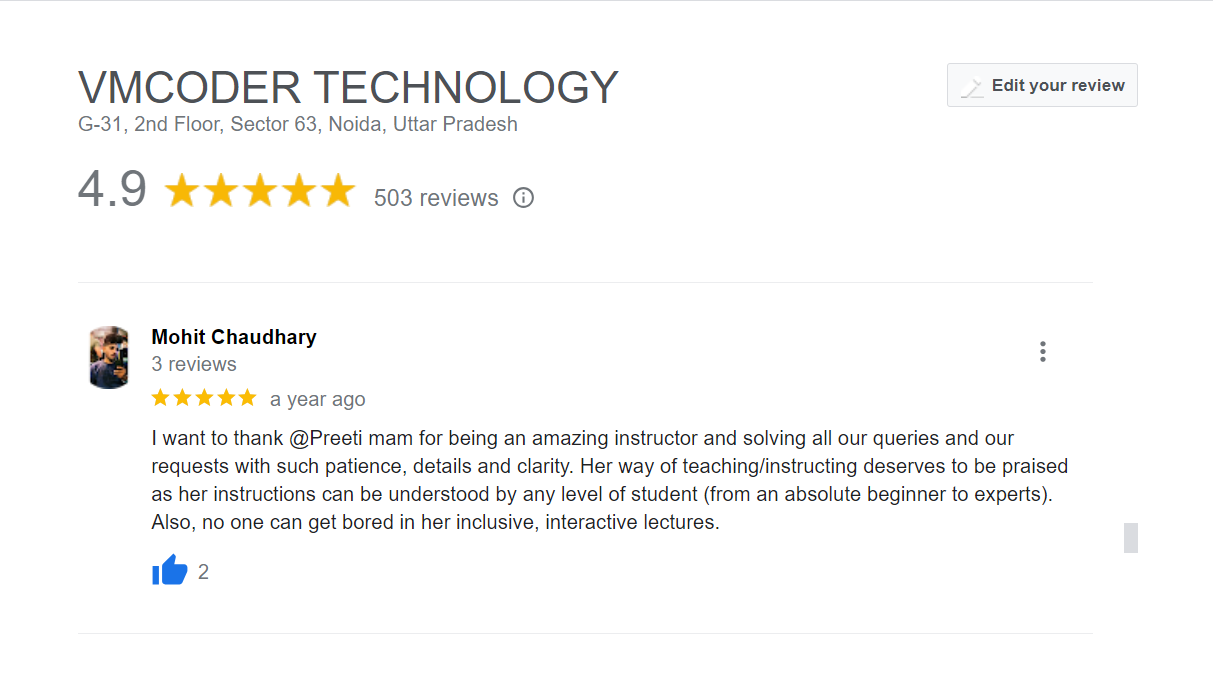
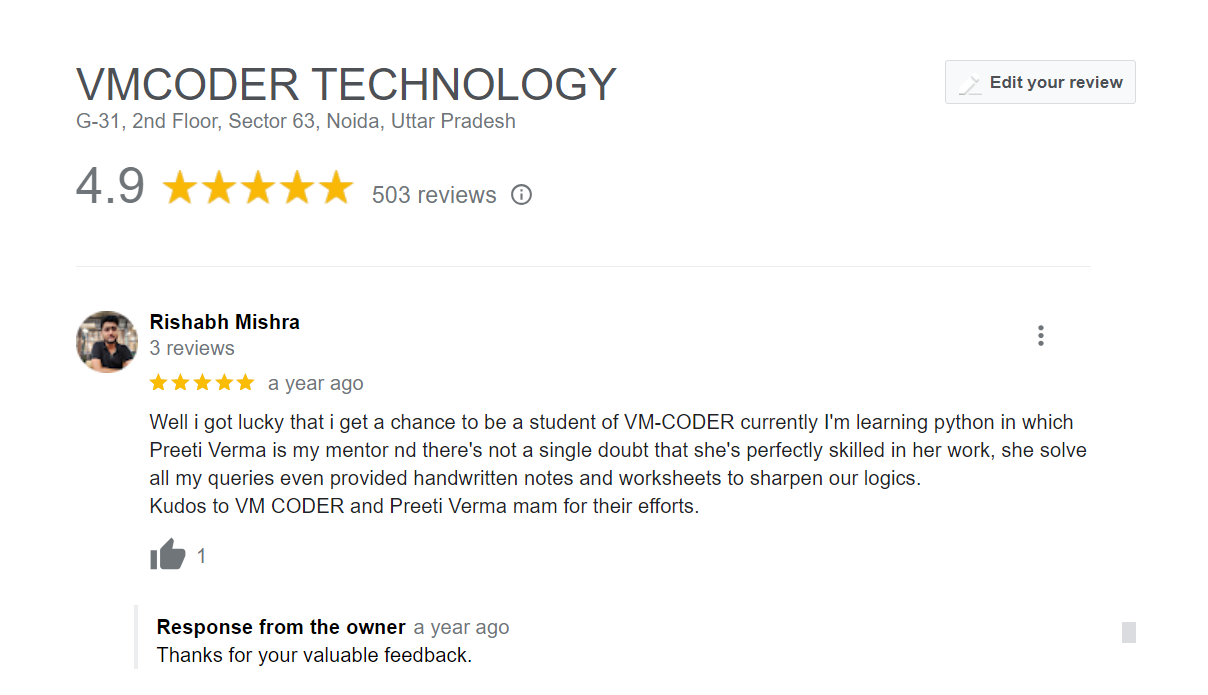
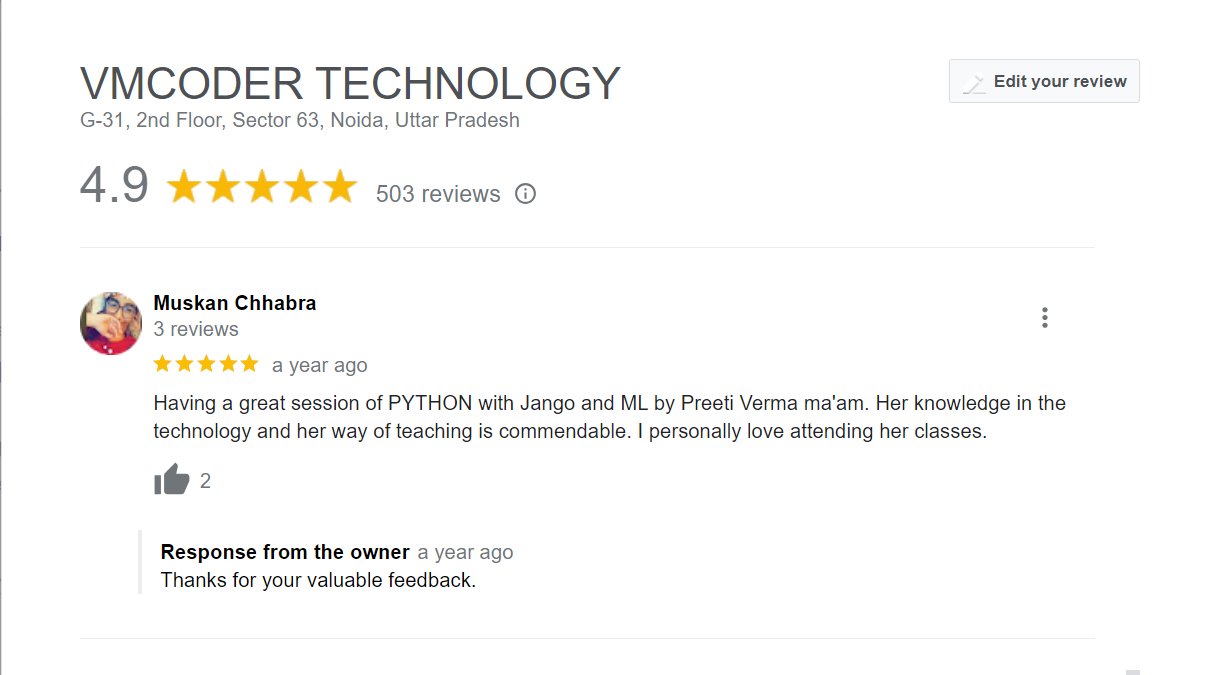

Effective Growth Strategies, Converting Websites & Online Marketing.
Obtain Your Accreditation
Showcase Your Accomplishments
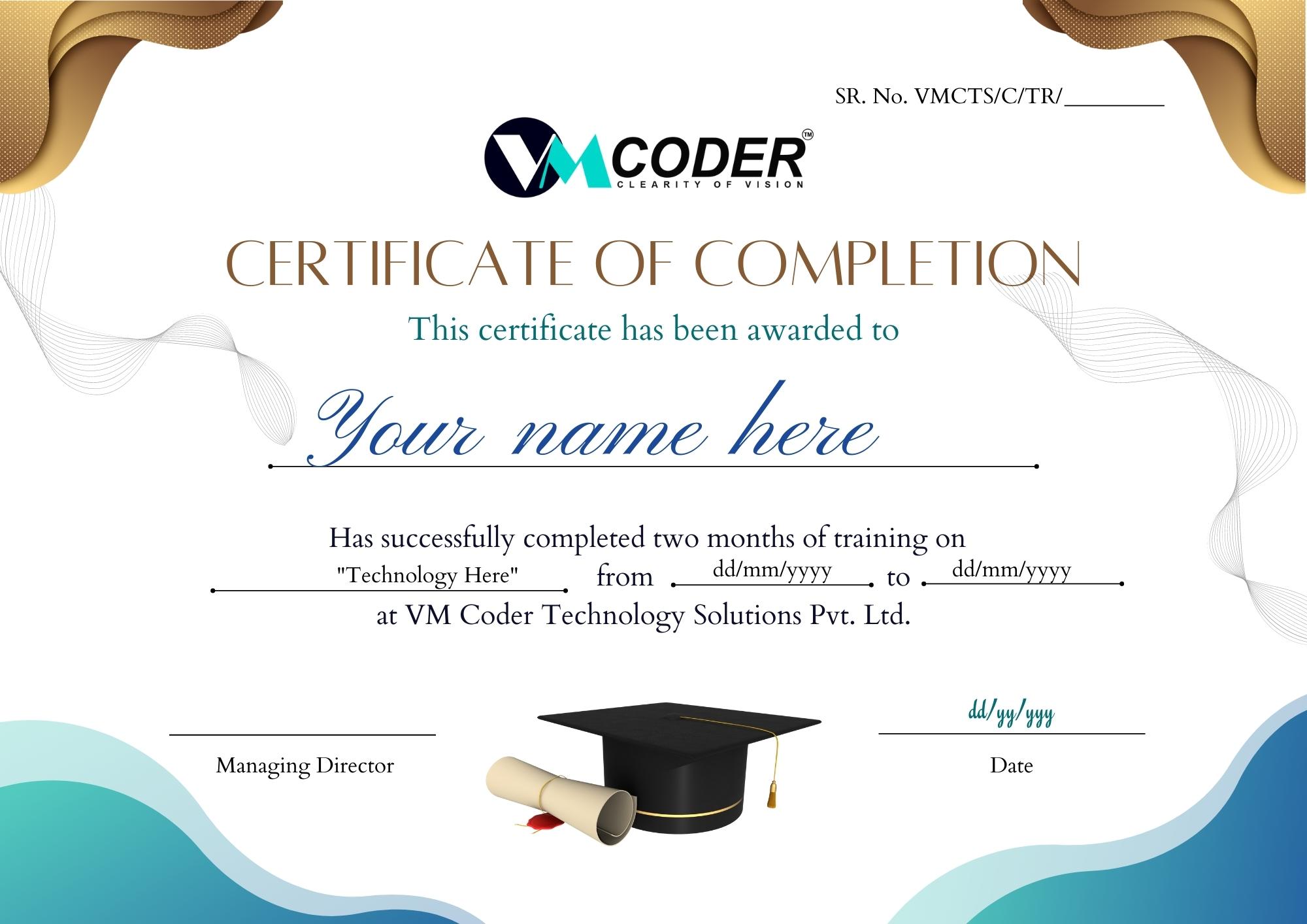
Placement Support

Career Advisor

Mock Interviews

Coding Quiz








 VM Coder provides best training and they also prepare you for interview and now I am working as a Python developer in a IT company with a good salary package.
VM Coder provides best training and they also prepare you for interview and now I am working as a Python developer in a IT company with a good salary package.





